
Allan Clarke of the Hollies in 2019
In the first part of our interview with the former lead vocalist of the Hollies, Allan Clarke, he talked about his heyday with the band and the hits that made the group famous. For fans, Clarke’s story ended in the late 1990s, when he left the music behind to concentrate on family matters.
Now, in one of the most welcomed recent comebacks, Clarke, born April 5, 1942, re-emerged with his second new album in nearly three decades. Titled I’ll Never Forget, and released in 2023 by BMG, he reunited with Graham Nash. (It follows 2019’s Resurgence.) He told Best Classic Bands why he left and why he’s now back.
Best Classic Bands: It’s great to hear you sing again. Many of us never thought it was going to happen.
Allan Clarke: Neither did I. It was just one of those things.
Watch Clarke make a rare guest appearance with Graham Nash and David Crosby in 2011, singing the Hollies’ “Bus Stop”
Graham and I have been together forever. I just couldn’t believe that I met this guy when I was seven years old. Even though we’ve been away from each other, we still keep coming back to do certain things like the Rock and Roll Hall of Fame.
Why did it take you so long to get back to music?
When I left the Hollies, there were two reasons why I actually stopped doing what I was doing. One of them was that I found it very difficult to reach the high notes. That was back in late 1999. I was on tour with the Hollies and it was just getting so hard for me that it came to I would have to give up. I wasn’t doing the sort of shows that I should have been doing. So in my own mind, I thought, well, why don’t you stop while you’re at the top? And, awfully at the same time, my wife got cancer for the second time. So when those two things aligned themselves, it really was a no-brainer. I was going to stop working and see how long I’ve got left with my wife. You can’t really make any plans when you’ve got things like that. So that’s what we did. We went away from the band and the living on the road and things like that.
Other performers say they’re going to retire, but you’re one of the few who actually did it.
Well, it was very important than I did, because when you’ve got cancer—I’ve lived with this three times in my lifetime—it’s not as if you get used to it every time it happens. There is a time after that you have to wait before you even think it’ll be all right. When we actually got to the five-year period, we relaxed, after that a little bit. Fortunately, my wife is still with me and we’re now in our 55th year, so things are good.
The first track released from I’ll Never Forget was written by Graham Nash, the catchy “Buddy’s Back,” a tribute to the rock ‘n’ roll great The Hollies were named after. “[It’s] a song I had written very quickly,” Nash told ABC Audio in June 2022. “It’s a very simple song…about The Hollies’ love for Buddy Holly.” The remainder of the songs were written by Clarke.
The title of 2019’s Resurgence pretty much tells the story of your return.
It took a while to get to that. There were other things that I was going to call it, but then we came to Resurgence as being the obvious thing.
It was a poem that you wrote with [singer-songwriter] Carla Olson that turned everything around. Can you tell us about that?
I think I started this around about 2017. It was just one of those days that I felt, well, maybe I should start writing some lyrics, and maybe get someone to put music to them. At that particular time I wasn’t singing; I wasn’t even singing in the shower. I’d actually given up. There wasn’t going to be any coming back from me. Everybody knows my voice with the Hollies, so everybody was used to me singing the songs that I sang, like “Long Cool Woman,” “He Ain’t Heavy” and “The Air That I Breathe.” There wasn’t any point that I was thinking of actually ever going back on the road. It just wasn’t possible at that time. I’ve known Carla Olson for a long, long time, and when I wrote this poem, I thought maybe I should send this to Carla and see if she can put some sort of music to it. And so that’s what I did. And she came back with a beautiful rendition of her own, but I thought, this isn’t really the way that I wanted it to go. So, I rang her back and said, “Thank you very much, it’s a great song, and please, please record it in your own way, but I’d like to try and put another piece of music towards it. You can have this particular song.” The original name of it was “A Love That Never Blooms.” I told her, “You can say that you’ve written a song with Allan Clarke’s poetry.” Then I went and got my guitar down off the wall and strummed my four chords that I know, and I actually pieced this piece of music together, which sounded pretty good. When you’ve done that, usually when you want to send it to somebody, you have to make a recording of it and then send it off. So, I was looking on my computer one day and I’d seen this little icon [for the app] GarageBand, which had been there for about six years and I said, “Well, I’m not going to touch that. I don’t know how to work it.” But my son Toby, who teaches music and performing arts, came up and he spent a couple of days with me and told me how to get things together. That gave me freedom to be able to deal with all the things I never thought I could do on my own, and I started writing music. “A Love That Never Blooms” turned into “I’m Only Sleeping,” which obviously had nothing to do with John Lennon.
Listen to a Clarke original song, “I’m Only Sleeping,” from Resurgence
You cover a lot of stylistic ground on that album. “Journey of Regret” has sort of a country flavor. Then there are some rockers and a couple of bluesy things.
I had no real reason for doing it. It wasn’t as if I was aiming to get an album out. I was just really enjoying myself for the first time. I thought, hey, I’m doing this on my own. I don’t have to go to somebody else and ask them which chord should I put in here? I always felt that part of the song was being taken away from me. So this particular time around, I wrote all the songs the way that I wanted them to be. I was always the kind of writer that never wrote in one particular style. So when the ideas came to me, which was probably the lyrics first, I always put those lyrics down, usually one-liners that came to me. I put them down and when I’d got maybe two verses and half a chorus, then I would try and put the music to it. And I suppose the lyrics would form the way it would be, which happens with songs. If you’re singing a love song, then you sing love lyrics.
Is there anything that ties all these songs together lyrically?
Not really. They’re just ideas that I picked out of the ether. I got into such a nice-feeling way of doing it that it seemed to be a lot easier for me to write things down. Before it would be really, really difficult. I’m not saying it was easy this time around. I was really enjoying it for the first time in a long time.
There’s a song on the album called “Long Cool Woman’s Back in Town.” What’s the story behind that?
I was writing another song and I had these words, which were, “Sometimes the right way’s the wrong way to go,” which, if you listen to the song, you understand what that means. I had tried to write a sequel to “Long Cool Woman,” to tie the two together. But it wasn’t working until that phrase came into my mind. So the idea was to write the story about what happened to the DA man when he left with this “Long Cool Woman.” And what did happen? What happened was he thought he was going the right way, but found out it was the wrong way, because in the end she just ditched him. It’s just simple as that. But I tried to make it in the same rock and roll vein. I’ve never gotten out of the ’50s, to be quite honest.
Listen to “Long Cool Woman’s Back in Town”
When you started making this new music, did you go back to the Hollies’ records to remind yourself of what you’ve done?
Not really, because I was recording in such a different way. [With the Hollies I] had a band around me, and now it’s one guy who is a one-man band, to be honest, even though we did get other people involved to do all the tricky solos—my grandson played on two of the tracks. Being with the Hollies was one of the greatest things that ever came into my life. At the age of 21, I was working at the mill and all of a sudden, overnight, only because these four guys called the Beatles from Liverpool started this whole revolution going, we became well known as the Hollies. The journey of that took me right up until 1999. We had so many good times and so many hits. Of course, the Hollies did rub off on what I was doing. I wanted to make this slightly different, because most of the other [solo] albums that I’ve done, I think the people said, “Oh yeah, this is the guy who sings for the Hollies.” I wanted to try and get away from that, of being the recognizable voice of the Hollies, and maybe get away from “Bus Stop” and “On a Carousel” and “Jennifer Eccles,” even though they were great hits and I enjoyed them being in the charts as much as they were. I didn’t do this with a determination to be different; it’s just I was so relaxed. It’s a different Allan Clarke, but it’s still me.
Watch Clarke in the studio, recording part of his new song “Journey of Regret”
If you ever do perform live again, would you do some Hollies songs?
Of course. I’ve got into a kind of life which is wonderful, even with all the pitfalls that have gone on from 1999 until only a couple of years ago. My daughter got cancer, so that was another reason for me being around to take care of certain people within my family that need my help. So I was an on-hands guy for 20 years. Everything’s fine now, it’s great. Carla Olson’s [manager], Saul Davis, has been trying to get me to record for about 30 years. I said, “I’ve stopped singing, I can’t sing anymore,” and he said, “No, Allan, you must try something.” Immediately I was sending these tracks over to Saul to get his attitude to was I was doing. And he said to me, “I like these songs. I think you should keep doing it.” I think what happened with me sending these tracks over to Saul, he approached a few people over in Los Angeles, and without telling me, just one day he sent me an email saying, “There’s a guy called Hartwig Masuch, the CEO of BMG ,who wants to meet you. So here’s his email. Get in touch.” I had lunch with him and we talked about things, what could possibly happen, what couldn’t happen. At the end of it, I said, “Does this mean you want to release it as an album?” And he said, “Of course.” When you make a decision like that, there are certain things that you have to do to commit yourself to this. We only did the deal back in November of last year, so he’s taken until this time to get the album released. When people ask me, “Are you going to go out on the road?” that frightens me because I have to start thinking, what do I do? What can I do? How long can I do it for? I have to get a band. I have to get this, have to get that. It’s not actually something that you can do overnight. I was with the Hollies for the better part of 35 years so I was quite used to having guys around me that I recognized. I knew what they could do and how loyal they would be. So what I’ve started thinking about now is I have to get a show together. This is the first album that I’ve ever thought about going out on the road with, and I have to think about my family. All those sort of things come into it as well, especially when it gets to my age.
Listen to “I’m Comin’ Home” from Resurgence
Clarke’s comeback albums are available in the U.S. here and in the U.K. here. His recordings with the Hollies are available in the U.S. here and in the U.K. here.
Related: Part one of our interview, where Clarke talks about the Hollies

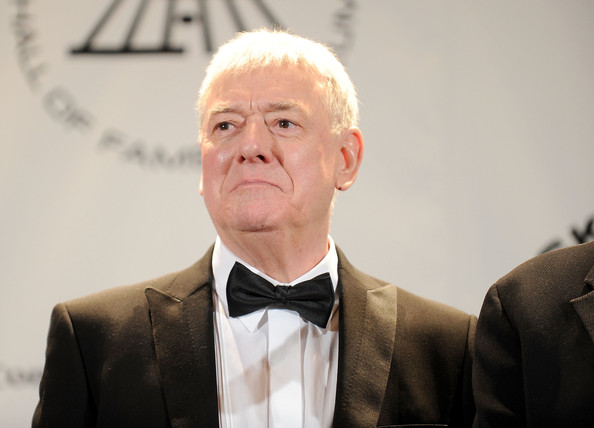
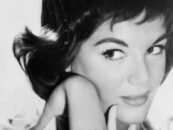
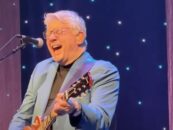
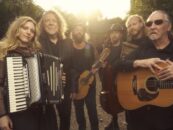
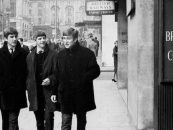

3 Comments so far
Jump into a conversationWhat a perspective on: Life, Family, Overcoming, Priorities, Opportunities for a seasoned ARTIST, and now giving us a taste of new music… You never were washed-up… You did the right thing by putting you family first… With you kids and grand-kids, you are now able to enjoy making some music! It would be grand if you considered just a few appearances when YOU feel like it! Do it in more personal venue and the people will feel EVEN MORE in touch with you as the man who: Had a long career in a BRITISH POWER BAND and yet, is a real person they can enjoy (with your talent)… “Skip” Spence in the States….
Great band,great singer and great songs! I saw him in Calgary in about 77′ and I still listen to the live album…
I didn’t grow up listening to The Hollies–only heard what my brother listened to–but I have loved discovering the group’s music from the 1960s-1980s and what you recently are doing. You need never think that all you’ve done is unappreciated. You are an amazing talent. You and Graham Nash have gotten back together. Have you considered reaching out to Tony Hicks, not to perform together but just as a friendly gesture to resolve any tensions?